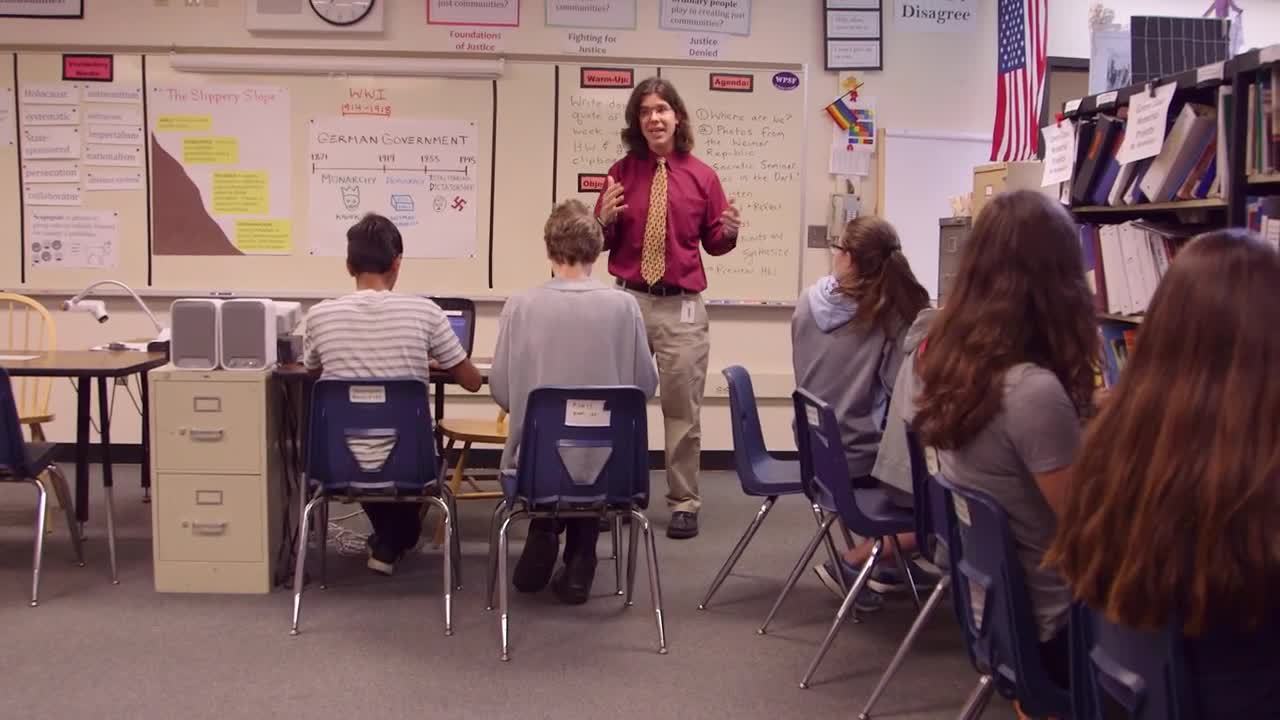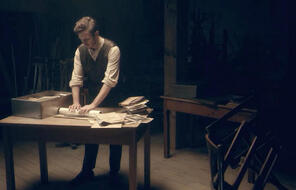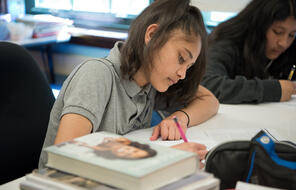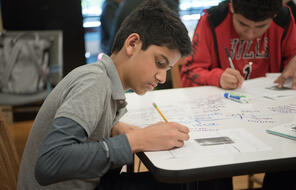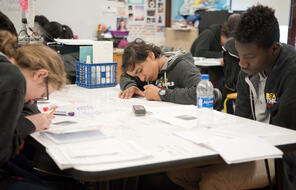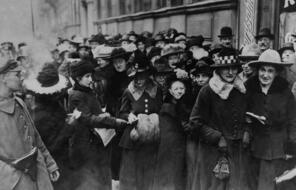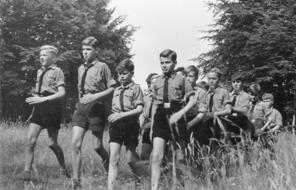[JAKE MONTWIELER] I'd like to start-- just to tell you about today what's going to be happening, we will situate you in history, remind you about where we've been and where we're going, where we been-- I think Facing History has really taught me to focus on the choices that people make. The choices that ordinary Germans are making in this period of Germany's history. It's really impacting the way history evolves, the way events unfold. I think Weimar-- we have that phrase, Weimar is a fragile democracy. And I think what we're studying today is an example of that. What does it mean to be fragile? What sort of democratic norms are not in place? And how ultimately does that contain the seeds for the democracy being disintegrated or for it transforming into a dictatorship in the early '30s? Weimar is an important time because it pushes students to think about the opportunity that citizens have to support their government, or not to really take an antagonistic approach towards their government- then how those choices impact the experiences of their fellow citizens. So I want to situate you for a minute before we look at these photos. So take a look up here at our timeline. We've had this up over the last week or so. And we are in this blue period here, right? When Germany is a democracy. It's after the Treaty of Versailles, and it's before Adolf Hitler becomes chancellor and Germany is turned into a dictatorship-- this blue period here. And our question is when Germany is a democracy, over the course-- especially in the late 1920s and into the early '30s, why do more and more ordinary Germans begin supporting the Nazi party? So I want to hear some of the things you remember we did this work last week. Germany in the-- again, early '20s, that is 1919 to 1923. [AUDIENCE] Inflation. [JAKE MONTWIELER] Inflation, good. And in fact, hyperinflation. What's that mean for us? [AUDIENCE] That their-- was that their money wasn't worth a lot-- or they had to pay more for the same things. [JAKE MONTWIELER] Right. Exactly. Both are true. You have to pay huge prices because their money is worth less. Yeah, absolutely. And there was some dramatic examples of that in the readings. Good-- hyperinflation, that's one trait of the early '20s. Alex, what else? [AUDIENCE] They're also mad at their political leaders because of-- they signed a treaty. And that made them feel like weak compared to all the other countries. [JAKE MONTWIELER] So the elected leaders of the Weimar Republic signed the Treaty of Versailles, and ordinary Germans were ticked off about that. Why were they angry about the Treaty of Versailles? [AUDIENCE] Well, it did not give them a lot of like-- it gave them-- first of all, it made them economically unstable with all the money they had to pay. And also, it made them feel weak and less like comparable to the other countries. [JAKE MONTWIELER] Yeah. Which parts of the treaty would make them feel weak? [AUDIENCE] The consul of-- I forget what it's called, the-- [JAKE MONTWIELER] The League of Nations. OK, right, because they weren't invited in. Let's hold on to the Treaty of Versailles for a minute. Why else would that really anger other folks? Which parts of that treaty really angered many ordinary Germans? [AUDIENCE] It made it so they had a smaller army. So they couldn't defend themselves. [JAKE MONTWIELER] Beautiful. Awesome. And they've come from this huge military engagement, right? And then to have it limited to 100,000 men, that's going to provoke anger. What else? [AUDIENCE] It kind of like cause poverty because like of all the money they lost and everything. So it made the Germans kind of angry because they lost everything that they owned because they had to pay so much money to the other countries. [JAKE MONTWIELER] Yeah, you got it. Exactly right. They have to pay reparations, and that that's causing economic hardships, including poverty. There are a couple other pieces. Devin? [AUDIENCE] Wasn't it like a really high unemployment rate? [JAKE MONTWIELER] Yep, absolutely. That's great. So joblessness, not having a job-- the rate was really high. [AUDIENCE] The German people were not happy with the elected leaders because they didn't make decisions very quickly, unlike the Kaiser did. [JAKE MONTWIELER] Oh interesting. So it's this idea like democracy is slow and inefficient might be something else. Keke, yeah? [AUDIENCE] After they lost, that they had to say that they caused the war. [JAKE MONTWIELER] Yeah, exactly right. The War Guilt Clause of the Treaty of Versailles, right? Germany had to say, like, this was all our fault, right? And you read about all the different causes of World War I. None of those really mattered according to the Treaty of Versailles, right? The Treaty of Versailles says Germany accepts full responsibility for this war. Awesome. OK. So guys, that was brilliant. Here's an image from the early '20s. Hmm. Ashley? [AUDIENCE] It looks like they may be eating out of the buckets. [JAKE MONTWIELER] Yeah. Eating out of these buckets. OK, Ashley, where are they? Are they inside in a kitchen or in a lunchroom in the school or something? [AUDIENCE] Like in a street. [JAKE MONTWIELER] Yeah. Why do they have buckets out in the street? [AUDIENCE] Because they're asking for food. [JAKE MONTWIELER] Right. These are kids out begging, right? Maybe they're on their way to a bread line. But a good image of kind of the suffering. And again, this is the early '20s. Couple more here. I'm going to give you some clues to this photograph. Once you think you understand this photograph, I want you to raise your hand. Don't say anything, just raise your hand, OK? So clue number one, this is during the period of hyperinflation. So a couple of people are like, oh, I think I know what's going on. Clue number two, just to remind you, hyperinflation means money is losing its value. And in fact, money becomes almost worthless. Clue number three, these aren't blocks. What's happening, right? What is this picture? Isabel, go ahead. [AUDIENCE] They're stacking a lot of like paper money, maybe just like buy something small. [JAKE MONTWIELER] Right Why would a parent give kids stacks and stacks of money to play with? [AUDIENCE] Because it's not worth that much anymore, and maybe buying like toys would be more than-- [JAKE MONTWIELER] That's right. It's cheaper to give your child stacks of money than to buy them blocks, right? Kind of an exceptional picture there. This myth-- right-- and you read about it last week, that at the end of World War I, Germany was betrayed. And some people in the late 1920s start to say, it's actually the Jews of Germany who betrayed the country. They were saying they're the source of our problems, right? If it hadn't been for the Jews, we wouldn't have this Treaty of our Versailles. In fact, we probably would have won the war. There is this specific idea about Germany in the 1920s, and that's that antisemitism is just below the surface. That there is a latent antisemitism that comes with 1,000 years of antisemitic history and myths and stories being told in Europe. And that the story of Weimar and the early years of the Nazi regime is that what's been below the surface is starting to bubble up. An image just offers all students access to a historical moment or to a historical question. And kids are very different places in terms of their reading ability. With some prompting, we can really teach them to look carefully at an image, and to make inferences based on images. I think that's super important. Also photographs in particular remind students that we are talking about a specific moment in time, right? That this is Germany in the 1920s. It's not 1950, it's not 1900, and some of that feels pretty important.
